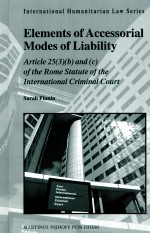
- 作 者:Sarah Finnin
- 出 版 社:
- 出版年份:2012
- ISBN:
- 标注页数:234 页
- PDF页数:266 页
请阅读订购服务说明与试读!
订购服务说明
1、本站所有的书默认都是PDF格式,该格式图书只能阅读和打印,不能再次编辑。
2、除分上下册或者多册的情况下,一般PDF页数一定要大于标注页数才建议下单购买。【本资源266 ≥234页】
图书下载及付费说明
1、所有的电子图书为PDF格式,支持电脑、手机、平板等各类电子设备阅读;可以任意拷贝文件到不同的阅读设备里进行阅读。
2、电子图书在提交订单后一般半小时内处理完成,最晚48小时内处理完成。(非工作日购买会延迟)
3、所有的电子图书都是原书直接扫描方式制作而成。
Chapter One Introduction 1
Chapter Two Background 11
Ⅰ Introduction 11
Ⅱ Background to Article 25 of the Rome Statute 11
A Different Models of Individual Criminal Responsibility 12
B Codification of Individual Criminal Responsibility under International Law 14
Ⅲ Introduction to Article 25 of the Rome Statute 20
A The Text of Article 25 20
B Modes of Liability under Article 25(3) 22
C Element Analysis Approach 26
D Identifying the Elements of Accessorial Modes of Liability 30
Ⅳ Methodology 31
A Methodology for Developing the Proposed Elements 31
1 Interpretation of the Language of the Rome Statute 31
2 Analysis of the Potential for, and the Appropriateness of, Adopting Elements Already Developed by Other Courts and Tribunals 33
3 Analysis of the Potential for, and the Appropriateness of, Drawing on General Principles of Domestic Criminal Law 36
(a) Common Law 38
(b) Civil Law 40
Ⅴ Conclusion 41
Chapter Three Accessorial Act 43
Ⅰ Introduction 43
Ⅱ Ordering 43
A Introduction 43
B Conduct Element 44
1 What Constitutes an 'Order' 44
2 What Constitutes the Giving of an Order 47
3 Conclusion 52
C Circumstance Elements 53
1 Features of the Accused 53
1 Nature of the Act Ordered 59
Ⅲ Soliciting or Inducing 60
A Introduction 60
B Conduct Element 62
1 What Specific Conduct Might Constitute Soliciting or Inducing 62
2 Whether the Solicitation or Inducement Must Be Direct and Public 66
3 Conclusion 70
C Circumstance Elements 70
1 Features of the Accused 70
2 Nature of the Act Solicited/Induced 71
Ⅳ Aiding and Abetting 72
A Introduction 72
B Conduct Element 72
1 What Specific Conduct Might Constitute Aiding and Abetting 72
2 Tangible and Intangible Support 74
3 Providing the Means 80
4 Proximity to the Act of Commission 82
5 Conclusion 89
Ⅴ Conclusion 90
Chapter Four Accessorial Object 93
Ⅰ Introduction 93
Ⅱ Introduction to Derivative Nature 94
A What Does 'Derivative Nature' Mean? 94
B The Impact of the Derivative Nature on Liability 95
Ⅲ The Non-Derivative Approach 98
A Introduction 98
B The Consequences of this Approach 98
C Is this Approach Open under the Rome Statute? 99
Ⅳ Two Derivative Approaches 101
A Introduction 101
B The Accessorial Object under the Strict Derivative Approach 102
C The Accessorial Object under the Partially Derivative Approach 106
1 The Distinction between Justification and Excuse 106
2 The Accessorial Object 113
D Which Approach Is Open under the Rome Statute 114
E Which Approach Is Preferable 118
Ⅴ Conclusion 119
Chapter Five Causation 123
Ⅰ Causation and Accessorial Liability 123
Ⅱ Jurisprudence of Previous International Courts and Tribunals 126
A Aiding and Abetting 126
B Ordering and Instigating 128
C Conclusion 130
Ⅲ Requirement of a Successful Contribution 130
A Introduction 130
B Domestic Law Requires a Successful Contribution 130
C Metaphysical Objection to Causation in Cases of Accessorial Liability D Conclusion Ⅳ The Necessary Condition Test 137
A Introduction 137
B Underinclusiveness of the Test 139
1 Concurrent Overdetermination Cases 139
2 Pre-Emptive Overdetermination Cases 141
C Conclusion 143
Ⅴ The Substantial Effect Test 143
A Introduction 143
B Limited Support for the Test in Domestic Jurisdictions and Commentary 144
C Vague,Circular and Subjective Nature of the Test 144
D Conclusion 146
Ⅵ Conclusion 146
Chapter Six Mental Elements 149
Ⅰ Introduction 149
Ⅱ Introduction to the Concept of Intent 151
A Gradations of Intent 151
B Direct Intent (in the First Degree) 153
C Oblique Intent,or Direct Intent in the Second Degree 155
D Recklessness and Dolus Eventualis 157
Ⅲ Introduction to Article 30 160
A Intent and Knowledge 160
B Element Analysis Approach 161
C Definitions of 'Intent' 163
1 'Means to' 163
2 'Aware it will occur in the ordinary course of events' 166
D Definitions of 'Knowledge' 173
1 Awareness that a circumstance exists' 173
(a) Wilful Blindness 173
(b) Knowledge of Normative or Legal Circumstances 174
2 Awareness that...a consequence will occur in the ordinary course of events' 175
E Conclusion 175
Ⅳ Exceptions to Article 30 176
A Interpretation of 'Unless otherwise provided...' 176
B Types of Exceptions to Article 30 180
1 Less Stringent Mental Elements 180
2 More Stringent Mental Elements 181
3 Additional Mental Elements 182
Ⅴ Conclusion 184
Chapter Seven Proposed Mental Elements 187
Ⅰ Introduction 187
Ⅱ Conduct Elements 188
Ⅲ Circumstance Elements 189
Ⅳ Consequence Elements 191
Ⅴ Additional Mental Element 197
Ⅵ Conclusion 204
Chapter Eight Conclusion 205
Ⅰ Introduction 205
Ⅱ Liability of the Generals for Soliciting/Inducing 206
A Proposed Elements for Soliciting/Inducing 206
B Element 1--Conduct Element 207
C Element 2--Circumstance Element 208
D Element 3--Consequence Element 209
E Causation Requirement 211
F Conclusion 212
Ⅲ Liability of Archer for Ordering 212
A Proposed Elements for Ordering 212
B Element 1--Conduct Element 213
C Element 2--Circumstance Element 213
D Element 3--Circumstance Element 214
E Element 4--Consequence Element 215
F Causation Requirement 215
G Conclusion 216
Ⅳ Liability of Banks for Aiding and Abetting 216
A Proposed Elements for Aiding and Abetting 216
B Element 1--Conduct Element 217
C Element 2--Consequence Element 218
D Causation Requirement 218
E Element 3--Additional Mental Element 218
F Conclusion 219
Ⅴ Conclusion 219
Appendices 222
Index 231
